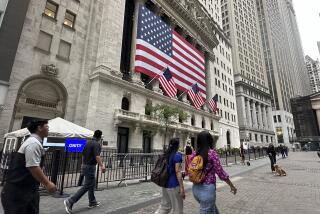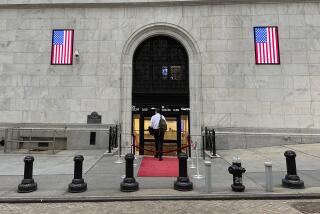HP Deal Could Trigger More Tech Mergers
- Share via
SAN FRANCISCO — Investors pummeled the shares of computer giants Hewlett-Packard Co. and Compaq Computer Corp. on Tuesday, a swift and harsh reaction to a proposed merger that begins the long-awaited consolidation of the nation’s technology industry.
HP shares fell 19% and Compaq’s 10%, unusually large drops that reflected deep pessimism on Wall Street about whether the merger can create a strong competitor to deal with the troubled future facing the technology sector.
Despite the chilly reception, the $21-billion acquisition of Houston-based Compaq by Palo Alto-based Hewlett-Packard could be the catalyst that reshapes the industry into far fewer and larger players, experts said.
The technology industry’s rapid and unprecedented growth came to an abrupt end last year, resulting in an 18-month free fall that created a choking overcapacity in manufacturing. The conditions are prime for a retrenchment that would consume jobs and destroy stock wealth, but that would set the stage for a healthy future, according to securities analysts and industry experts.
Monday’s announcement that two of the biggest and best-known names in this once-thriving business are joining forces represents a watershed event for the industry. Experts say technology is facing the same kind of historic pressures long seen in the so-called old-economy industries such as aerospace, autos and steel.
Lockheed Corp.’s acquisition of Martin Marietta Corp. in 1995 added fuel to a massive consolidation in the aerospace business, a once-unthinkable trend in an industry that was responsible for the security and defense of the U.S. The Chrysler-Daimler merger in 1998 led to a domino effect that reduced the number of independent auto makers.
“We’re heading for the automobile model in the personal computer market--it’s a mature industry,” said Fred Hickey, editor of the High-Tech Strategist, an investment newsletter in Nashua, N.H. “That sort of market can only support a very small number of players.”
With the exception of the telecommunications sector, there simply haven’t been any gee-whiz deals of the size or scope of the HP-Compaq combination. That could soon change.
Several large hardware and software companies are so weakened by the market downturn that they could become prime acquisition targets for technology giants such as Cisco Systems Inc. or IBM Corp., which combine hardware with a wide range of software and services, said Rob Enderle, a technology analyst with Giga Information Group.
More Weak Players Will Be Seeking Suitors
The HP-Compaq merger also might presage a run of failures among companies that cannot find saviors in today’s technology downward spiral, Enderle said. Most tech sectors suffer from such extreme overcapacity that relatively strong, cash-rich players--such as Dell Computer Corp. and IBM in computers, Cisco in network equipment and Intel Corp. in microprocessors--might simply cherry-pick smaller targets that develop exciting new technologies.
And as Dell and Intel have done in recent weeks, they might then move to kill off struggling competitors with cut-rate pricing.
“Dell will never buy [PC rival] Gateway because they know they can get [Gateway’s] business otherwise,” Hickey said. “They will let them die, squeeze them out.”
Likewise, chip maker Advanced Micro Devices Inc. and network equipment giants Lucent Technologies Inc. and Nortel Networks Corp., among others, face bleak prospects in a contracting tech economy.
“We are going to see a lot more consolidation. But unfortunately, it will be companies that are looking to be rescued, seeking a suitor before they run out of cash,” said Michael Murphy, editor of the California Technology Stock Letter.
Ten years ago, a struggling tech firm could hope to reinvent itself on the strength of one brilliant idea or a catchy marketing strategy. Now, competition in an increasingly global marketplace requires huge capital investments that smaller players have little hope of raising, particularly in a down economy.
“We have dominant leaders in many areas,” including chips, network equipment, PCs and software, Murphy said. The trend explains how Dell continues to take market share from all of its PC competitors. Dominant firms create a gravitational pull that draws business away from their competitors.
“This is why AOL can attract advertising when [Yahoo and other smaller Internet sites] can’t,” Murphy said. And it accounts for why companies such as Yahoo--with little or no profit but strong name recognition and huge customer bases--are widely viewed as appealing takeover targets for larger, more diversified firms.
Acquisitions Not Necessarily a Cure
But tech mergers are no panacea. They can be difficult to manage even in a strong economy because of differing technical standards and corporate cultures, said David A. Katz, chief investment officer of Matrix Asset Advisors, a New York money management firm that owns shares of Compaq and HP.
“A lot of companies are currently preoccupied with their own internal operations, given the current climate,” said Glenn Robson, a managing director with Morgan Stanley Dean Witter in Los Angeles who specializes in corporate financing for tech firms. “They are reluctant to take on the challenge of integrating another firm in this environment.”
Compaq acquired Digital Equipment Corp. in 1998 for more than $9 billion but continued to lose ground to Dell and others. That point was not lost on investors, who savaged Compaq and HP shares Tuesday. HP dived $4.34, or 18.7%, to $18.87 on the New York Stock Exchange, its lowest price since 1996. Compaq fell $1.27, or 10.3%, to $11.08, also on the NYSE.
Cisco made 23 acquisitions last year, only to suffer a multibillion-dollar loss this year.
JDS Uniphase Corp. streaked to stardom in the once-burgeoning market for optical networking components that direct data streams on light beams, by devouring the competition, gobbling up companies with its soaring stock.
‘A Decelerating Rate of Innovation’?
In July, JDS announced a jaw-dropping $51-billion loss in its last fiscal year--one of the largest losses in corporate history. With its stock severely depressed, JDS is now seen as acquisition fodder itself.
Would-be buyers of such struggling companies might hold off until the price drops even further--until they have found the bottom in the tech recession.
Because most mergers of the late 1990s were stock swaps at a time when stock prices were high, many technology companies that have seen their stock prices battered this year are hesitant to use stock as currency, Robson said.
This could prompt a wave of bankruptcies among companies that a year ago would have been purchased for a steep premium over their stock valuation.
Joel Hyatt, a professor at Stanford University, called the consolidation--whether through mega-mergers like the proposed HP-Compaq deal or by attrition of smaller companies--a dangerous trend that could reverse technology’s long-term ascendancy as the driving force in the economy.
“I worry that we may see a decelerating rate of innovation,” Hyatt said. “What drives the ‘new economy’ is technology innovation,” and smaller, more nimble and entrepreneurial companies often spark the big ideas later developed by industry titans.
“Can they maintain what has long been called the ‘HP way,’ at the scale they achieve post-merger?” he asked. “A deal like this is worrisome because it might impede innovation.”
Times staff writers Debora Vrana in Los Angeles and Thomas S. Mulligan in New York contributed to this report.






